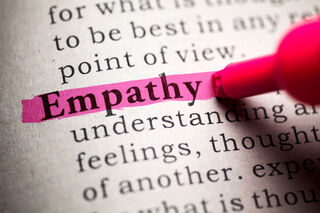Empathy
Action vs. Contemplation? Finding Answers in Empathy
Trying to decide your major? Or looking for balance in life? Empathy helps us.
Posted October 13, 2022 Reviewed by Michelle Quirk
Key points
- Action and contemplation are entwined and interdependent.
- Our empathy and connection to others defines so much of what we think about and do.
- There are longstanding “careless thoughts” in human history that still trap us.

College students are thinking about what field they wish to major in, how they will make a living, and also about the meaning of their lives in this complex and changing world. These questions circulate across generations.
Jennifer Summit and Blakey Vermeule’s 2018 book, Action Versus Contemplation: Why an Ancient Debate Still Matters, traces these questions from Greek philosophy to modern pop culture, Socrates and Plato to Pixar’s "A Bug’s Life." They explore tensions of practical work and leisure, humanities versus science versus technological and technical studies and occupations. They touch on questions of what it means to be human at this historical time. My main critique of their work is that it is essentially Eurocentric, and the West, particularly America, seems to have more than doubled down on action over contemplation. But, of course, action and contemplation are entwined and interdependent. Action versus Contemplation is well worth a read. But, naturally, even after reading it, questions linger.
Amplifying the Empathic Life
I believe the impasse between the “active” and “contemplative” lives can only be resolved by amplifying the empathic life. Our empathy and connection to others defines so much of what we think about and do. As Bryan Stevenson of the Equal Justice Initiative says, “our proximity to suffering brings us to our embodiment as humans.”
It seems clear that action without contemplation can be hugely problematic. In You Are Not a Gadget, technologist-cum-philosopher Jaron Lanier cautioned against becoming “entrapped in the recent careless thoughts of others,” referring to being passively trapped in algorithms and ways of thinking about one’s life that become embedded in technology and social media. Technologists create “facts on the ground,” not easily dismissed and potentially dangerous. Are we using our devices and apps, or are we being used by them? This is an ongoing challenge as we try to retain agency in our new technological environment. What happens to our abilities to contemplate and empathize as we are drawn into screens? What new kinds of suffering are we now proximal to, and what do we do with these, to bring us to our human embodiment?
Careless Thoughts
However, there are quite longstanding “careless thoughts” in human history that still trap us. Racism, sexism, religious intolerance, homophobia, gender bias, able-ism, violence, and all the ways that abusive power and unconscious bias impact us are “careless thoughts” and attitudes that we must contemplate and bring to attention before acting. They are part of a “cultural algorithm” that we can unconsciously fall into unless we actively resist. The algorithm of the dominant culture acts on and conditions us all. We are in danger of becoming tools for its wiles unless we uncouple from its “matrix.”
Philosopher Paul Virilio writes, “when you build the ship, you build the shipwreck.” So much of society, especially politics, looks like a shipwreck right now. Why would we continue to mindlessly build with our actions? We need more contemplation and more empathy.
Caring people wish to minimize or eliminate harm. We wish to step out of the position of exploiting others and contribute to the general welfare instead. Some of us work toward liberation of self and others from suffering and the causes of suffering. This requires contemplation, certainly, but also cultivation of empathy, compassion, mindfulness, creativity, and relationship. Growth and change can only happen at the pace of relationship, and relationship requires commitment to the well-being of people not outwardly “like” ourselves. From our relationships will come the ideas and actions that truly minimize and eliminate harm and suffering.
It’s great when we have leaders, friends, teachers, artists, and other community members who encourage us to think and care more deeply about our own humanity and reflect on the humanity of others.
This is not always the case.
Interpersonal Antagonism
American and global political life seems to be foundering on questions of empathy. Right-wing leaders around the world reject empathy as they promote misunderstanding and scapegoating of racial, ethnic, sexual, and religious minorities. Preaching paranoia about minority groups sounds “tough” and looks powerful and intimidating. Tough and powerful intimidation seems to be appealing to a significant number of people. I am worried about the amplification of interpersonal antagonism and the subordination of empathy in a significant slice of the population and worried about individuals and dominant cultures consumed by paranoia about difference.
As I wrote in another essay, “I take it as a given that individually, we all have limits on dealing with intrapsychic, interpersonal and political conflicts.” Paranoia is one way of “expelling” one’s own insecurities and intrapsychic conflicts onto others and then judging them for them.
When intrapsychic conflicts have become interpersonal and then political, what are we to do?
Let’s slow down, and build our capacities to empathize, contemplate, and be compassionate. Let’s build our capacities to care for ourselves and each other in a time of stress and change.
Actions will come, but if they arise from these principles, we will build from our strengths as humans, and not from our fears and untamed defensive drives to dominate, antagonize, persecute, and destroy. The creative life must outweigh the iterative life built of thoughtless actions.
Now choose your majors, everyone! Whether you’re in school or not, we’ve all got a lot to learn, feel, and be with.
© 2022 Ravi Chandra, M.D., D.F.A.P.A.
References
For additional reading:
Chandra R. MOSF 17.11: Do Trump Supporters or Their Opponents Have “Good Hearts”? East Wind eZine, October 6, 2022


